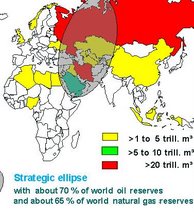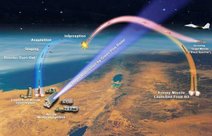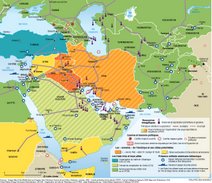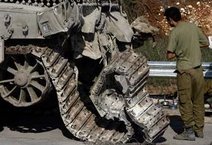
The Final words on the Palestinian / Israeli problems
Hamas is not the real problem
October 23, 2009
By Henry Siegman
Ha’aretz has courageously and repeatedly exposed the deceitfulness of this and previous Israeli governments’ pretense that their goal is to find a viable Palestinian peace partner. It is therefore important to guard against the implication of the question - whether Israel should engage Hamas in peace talks - posed by the paper, namely that Israeli governments have had an interest in holding peace talks if only they could find a willing partner. Time and again, when presented with a choice between peace and continuing Israel’s expropriation of Palestinian land, Israeli governments have chosen land over peace. Indeed, an American president who shows the slightest signs of taking peacemaking seriously is immediately suspected - not only by Israeli governments but by Israel’s public - of anti-Israel, if not anti-Semitic, motivations.
Israeli governments have avoided dealing with Hamas not because they fear that engaging the organization might not produce a peace agreement, but because they know they could not manipulate Hamas the way they have been able to manipulate Palestinian President Mahmoud Abbas - namely, by using content-less peace talks as a fig leaf for the continued expansion of the settlement enterprise. Israeli governments have latched onto Abbas as their peace partner of choice not because of his “moderation” - his conditions for a peace agreement are not much different from those of Hamas (after all, Hamas has agreed to allow Abbas to conduct peace talks on behalf of a unity government) - but because negotiations with Abbas shield them from the need to deal with Hamas while at the same time enabling them to claim that he is incapable of delivering popular support for the compromises he needs to make. It is a classic case of having your cake and eating it too.
If an Israeli government were truly interested in reaching a peace accord that would end the occupation and establish a viable Palestinian state, it could do so only with a government that includes both major Palestinian political parties, Hamas and Fatah. It is precisely because Israeli governments know this that they have consistently incited Fatah to engage in fratricidal conflict with Hamas, and threatened to cut off the perks extended to Abbas and his colleagues should he even think of joining it in a unity government.
Undoubtedly, this view of Israel’s various governments, and particularly of Prime Minister Benjamin Netanyahu’s government, may be dismissed by some as overly harsh. After all, didn’t Ariel Sharon seek to reverse his earlier rejectionism by turning Gaza back to the Palestinians, and did not Hamas repay his good intentions with rocket assaults on Israel’s civilian population?
The answer to both of these questions is “No.” No, Sharon did not intend the removal of the Gaza settlements to reverse Israel’s settlement enterprise in the West Bank. Its purpose was the exact opposite: to obtain president George W. Bush’s consent for the deepening and widening of Israel’s hold on the West Bank. And no, Hamas did not send rockets into Sderot - a war crime no matter what their purpose - in order to repay Sharon for his generosity, but in response to the prime minister’s strangling of Gaza, also a war crime.
The man in Israel best qualified to know exactly what Sharon had in mind is Dov Weisglass. He was not only Sharon’s closest confidant, political advisor, personal lawyer, and chief of the Prime Minister’s Bureau, but also the one who negotiated the deal with the United States over the removal of the Gaza settlements on behalf of Sharon. Here is how Weisglass described that deal, in an interview in Ha’aretz:
“What I effectively agreed to with the Americans was that part of the settlements [i.e., the major settlement blocs in the West Bank] would not be dealt with at all, and the rest will not be dealt with until the Palestinians turn into Finns.... The significance [of the agreement with the United States] is the freezing of the political process. And when you freeze that process you prevent the establishment of a Palestinian state and you prevent a discussion about the refugees, the borders and Jerusalem. Effectively, this whole package that is called the Palestinian state, with all that it entails, has been removed from our agenda indefinitely. And all this with [President Bush’s] authority and permission... and the ratification of both houses of Congress.”
That is why the first question should not be, “Should Israel talk to Hamas?” but rather, “Should Israel be allowed by the United States and the international community to continue its settlement enterprise to the point of irreversibility?” Netanyahu has already broken his promise to President Barack Obama regarding a limited moratorium on construction outside the settlement blocs. Construction in those settlements continues stealthily. An appropriate response to this continuing deceit would be an American engagement with Hamas, conditioned on Hamas’ implementation of its promise to allow Abbas to negotiate a peace agreement on behalf of a unity government. This would be a clear indication by the United States and the international community that the answer to that first question is “No.”
Henry Siegman is director of the U.S./Middle East Project and a former national director of the American Jewish Congress and of the Synagogue Council of America.
No fix soon on Palestinian question
Arnaud de Borchgrave
October 26, 2009
http://www.washingtontimes.com//news/2009/oct/26/no-fix-soon-on-palestinian-question/print/
Arnaud de Borchgrave
October 26, 2009
http://www.washingtontimes.com//news/2009/oct/26/no-fix-soon-on-palestinian-question/print/
Unless former Sen. George J. Mitchell, President Obama's special Middle Eastern envoy, is prepared to commute by government executive jet for the next five to 10 years, this isn't a bad time to turn in his badge.
Israel's vice prime minister and minister for strategic affairs in Israel's 32nd government Moshe Ya'alon talked his way through Washington's corridors of power this week, spelling out the Jewish state's refurbished negotiating posture for a Palestinian state. Bottom line: The Nobel Peace Prize will not help Mr. Obama's quest for an independent homeland for the Palestinians by the end of his first term. Even if re-elected, the geopolitical prize would most probably elude him again.
Israel wants to slow down the whole process of negotiations with the Palestinians. Mr. Obama wants both parties to accelerate. But Congress seldom allows any daylight between Israeli and U.S. positions.
Israel has scuttled its from-the-top-down negotiating strategy that had Mr. Mitchell meeting with Israeli and Palestinian leaders who then mouthed platitudes until their next meeting. The new posture is what Israeli topsiders call from-the-bottom-up. In other words, you start with itemized minutia, for which Mr. Mitchell's good offices would be a waste of his manifold talents. Key topics like final borders, the return of refugees, the dismantling of Israeli settlements, the status of East Jerusalem, a security fence along the Jordan River against terrorist infiltrators from Jordan - all would be postponed sine die.
The ostensible reason for the change is the refusal of Palestinian interlocutors to recognize Israel as a Jewish state, a national home for Jews from anywhere (there are about 15 million in the world, including 5.5 million in Israel, 6 million in North America, 2.5 million in Europe and Russia).
Instead, the Israelis want to talk about the details of a truly demilitarized Palestinian entity. Haggling over the number of guns and ammo depots allowed for a non-army military with non-army uniforms would keep negotiators busy for months. Air rights would be disallowed by Israel. But Palestinians want small commuter aircraft that would fly to Amman, Jordan and Damascus, Syria. Israeli settlements now sit astride the West Bank's water aquiver. Palestinians want their share. This would entail dismantling part of the $2.5 billion wall-fence-razor wire that snakes 420 miles in and out of the West Bank. That, too, could stretch months into years.
The more Prime Minister Benjamin Netanyahu and his Likud hard-liners think about the strategic dimension of an independent state, the more they conclude it would be a victory for Muslim radicals. Hamas, the radical Palestinian organization that now rules Gaza, is entirely dependent on Iran's Revolutionary Guard-cum-Mullah regime. It also has a strong underground in the West Bank.
As Gen. Ya'alon adjusts his geopolitical specs, he sees nothing but 360-degree trouble for Israel. A revanchist Palestinian state on its borders, staring wistfully at Israel's Mediterranean border, which was once Palestine's, could quickly morph into a hostile entity. Israel's strategic thinkers also see the Sunni-Shia conflict rearing its ugly face in Iraq, Iran, Saudi Arabia, Lebanon and Yemen. On the mental map, the laser pointer traces an axis of trouble from Afghanistan to Pakistan to Iran, to Iraq, to Egypt, Sudan, Somalia.
The ruling Likud Party sees the entire region divided between "Jihadis and moderates," with radical Islam aligned against the West, a struggle that started with Islamist revolutionaries seizing power in Iran in 1979. Western civilization, say Israel's leaders, is the jihadis' "main enemy." So further territorial concessions in the West Bank, they now conclude, merely empowers jihadis. This alone should convince Mr. Mitchell that he is embarked on mission impossible.
As proof of their latest arguments, Likud leaders say moderate Arab leaders' recognize the main threat to their region is Iran, not Israel. So the core of the Mideast problem is Iran and its nuclear ambitions, not the Arab-Israeli dispute. They hope for tougher sanctions between now and the end of the year. They see the Iranian regime a shambles with the Revolutionary Guards struggling to keep control against the "twitter" revolutionaries. And if Tehran hangs tough into 2010, Mr. Netanyahu plans to reassess the military option - with or without the United States.
For the first time, Israeli leaders concede privately Iran does indeed possess formidable asymmetrical retaliatory capabilities that go from mining the Strait of Hormuz, interrupting 25 percent of the world's oil flow, to mayhem up and down the Gulf, all of which could shoot oil up to $300 or more and plunge Western economies into an outright depression. But they also believe the U.S. Navy would quickly demine Hormuz and silence Iranian missile batteries firing at U.S. warships.
This, of course, would bring the United States into open conflict with Iran. And while Mr. Obama might hesitate to be cast as Israel's only ally in a regional war, Congress would quickly lend support to Israel.
Israel's leaders were stunned by the Goldstone report, commissioned by the U.N., on the Jewish state's 2008 assault on Gaza in which almost 1,400 Palestinians, including 900 civilians, and only 13 Israeli soldiers were killed. Richard Goldstone, the South African Jewish jurist who led the investigation and authored the U.N. report, accused Israel of war crimes and crimes against humanity. Predictably, he was quickly tagged as a "self-hating Jew." But he is one of his country's most respected personalities, at the forefront of the struggle against apartheid and a key legal architect of the new South Africa.
All of which has led some to speculate the two-state solution for the Palestinians and Israel has gone the way of the dodo. Former U.N. Secretary-General Boutros Boutros-Ghali told this reporter in Cairo last week, "This is now headed for a one-state solution. But it's probably 10 years away."
Does all this mean that Israel has a historically short "shelf life"? Said one ranking Likud official, "We've had 100 years of Zionism, 62 years as a Jewish state, and we're now 6 million. With what we've achieved in science, agriculture, the military, we're not about to disappear."






























